The Mekong sub-region is shaping up to be a flashpoint for land grabs carried out not only with impunity but also with callous disregard for the people’s rights. The various stories of struggles shared by each Mekong country firmed up the collective understanding of the extent of control that states and the businesses they partner with exert over productive resources and, by extension, over vulnerable sectors and communities.
In response to this worsening situation, delegates from different Mekong-based peasant and indigenous peoples’ organizations went on to discuss strategies for solidarity and cooperation aimed at confronting land and resource grabbing in the region. Amid the nuances of their agrarian struggles, they strived to find a common ground upon which their organizations can build resonance and, more concretely, a regional approach to executing their plans of action.
The workshop groups assessed the land and human rights situation in the region in light of recent developments and with respect to research, policy advocacy or engagement with policy makers at various levels, community mobilization, and capacity and skills development, among others. From there, they identified gaps, weaknesses, and key pressure points among common specific issues that they can work on together, for a set of activities and initiatives, moving forward.
State monitoring of research and advocacy work
The first workshop group, composed of representatives from Myanmar, Cambodia, and Laos, zeroed in on research and advocacy, and worked out what weaknesses and challenges hamper their work in both areas.
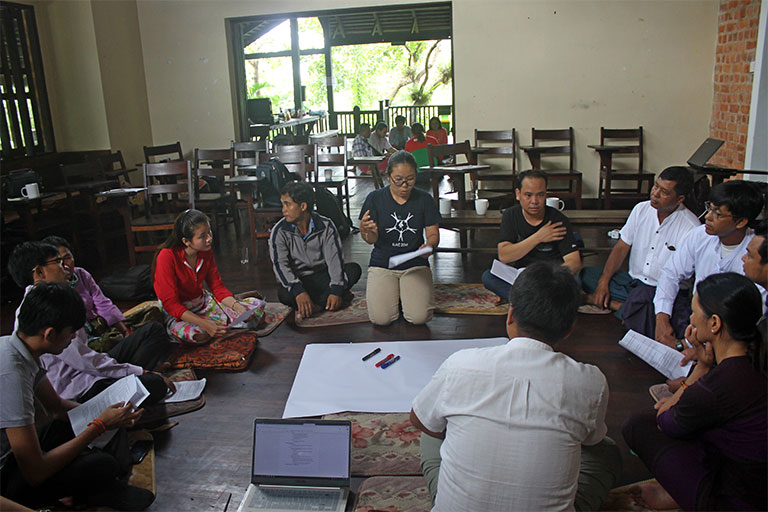
They reported that a huge barrier to pursuing land-related cases is government intervention, principally in the form of surveillance or monitoring. For instance, local authorities would bar residents from talking to NGO workers, all while embroiling the latter in bureaucratic red tape when requested for data or permits to undertake community visits. Many officials lack willingness to engage at all. The group illustrated this issue by citing Cambodia as an example, where an NGO law remains in place and compels nonprofits to await weeks to months before hearing responses to multiple documents and letters of request submitted.
Barring these external hurdles, data crunching and analysis also becomes a tall order for an organization that, more often than not, houses only several full-time staff who may not be not as skilled or trained in research work. This indirectly impacts policy advocacy as the latter, in order to be insightful and effective, relies on thoroughly interpreted data and evidence-based conclusions. The group reckoned that capacity building must thus be given emphasis to ground their grasp of land issues in empirically sound data.
Yet, to get at the data in the first place, the group saw the need to support laws guaranteeing access to information. Once instituted, they can facilitate the free exchange of information between organizations working on land struggles. In particular, updates on issues that are most pressing in all Mekong countries, such as Chinese investments, can be shared among one another, studied, and campaigned on.
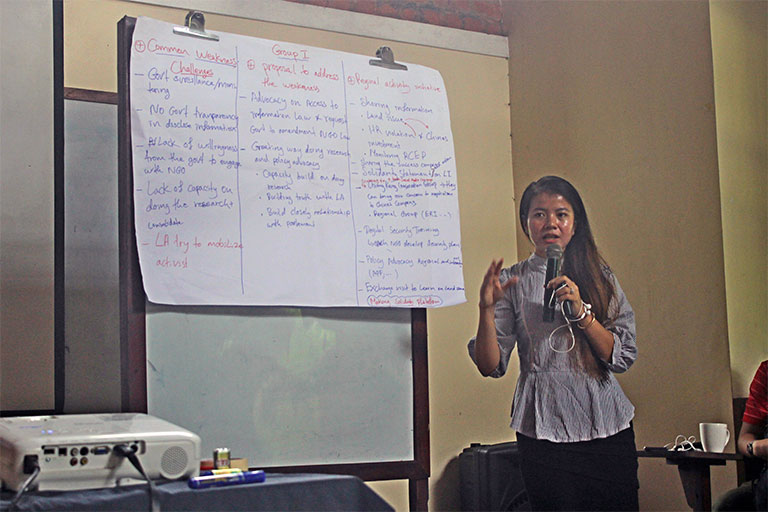
The group also encouraged Mekong-based organizations to engage in solidarity actions, which they thought helpful in furthering local campaigns and elevating them to the regional arena. Fostering linkages with various regional or international networks, they said, could go a long way towards strengthening campaigns against land grabs and rights violations, among others.
Social media sites like Facebook can likewise help in this regard, especially for wider reach and clout. Yet the group cautioned against depending too heavily on these online platforms and recommended providing training in digital security to organizations that might be targeted or persecuted for their line of work. Land disputes are a particularly fraught problem in Mekong countries that may put activists and CSO advocates in the crosshairs of the government or powerful private actors. There is, then, a need for a secure platform for cooperation that takes into consideration the contexts the various groups are coming from.
Censorship of media, CSOs, and agrarian movements
Another workshop group also cited denial of access to information as a huge deterrent to engaging in research work. Apart from government agencies withholding data, there are communities as well that would have made a good research subject but remain out of reach, due typically to either distance or tight government/military control. What little data the NGOs may gather from the government or on the ground could be unreliable and form an incomplete picture of the scope of land grabbing in the Mekong region.
Data collected by individual organizations can be expanded if there exists a platform to unite or centralize similar efforts. The same goes for policy advocacy, because at present, the campaigns by various peasant organizations in the Mekong are fragmented and often find it hard to gain traction or larger audience. Avenues for engagement are constrained, few and far between.
In countries like Laos and Myanmar where the state influences traditional channels of communication like the press, very few recourses are at an organization’s disposal to get its message across — even fewer still for those involved in such contentious causes as peasants’ rights to land and resources.
The implications of this challenge manifest in communities, where raising residents’ awareness of issues like the Vacant, Fallow, and Virgin (VFV) Land Law in Myanmar would usually take several months. As with any organizing work, it is crucial to inform the communities of their stakes in the issues at hand, the impacts of policies that run roughshod over their interests, and the many ways they can contribute to the struggle for asserting their rights.
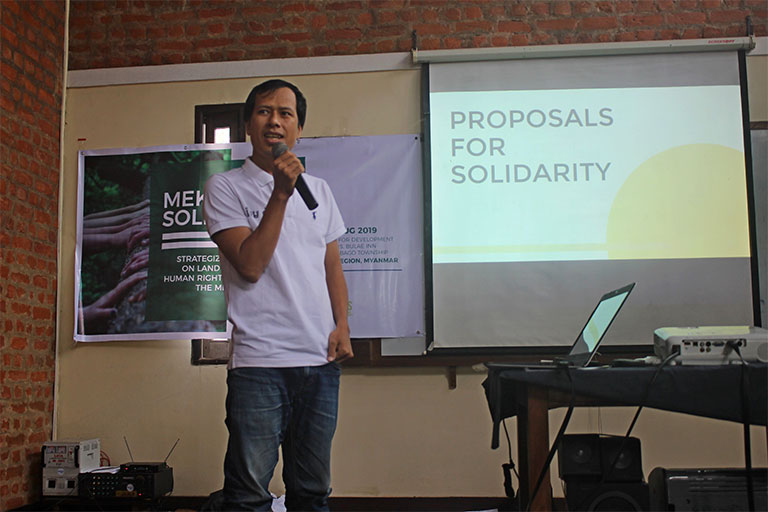
To fill in these gaps, the workshop group echoed the previous group’s suggestion of building one regional platform with which to connect farmers’ and indigenous peoples’ organizations in the Mekong. A region-wide campaign can thus be mounted while still putting the spotlight on local struggles against, say, the VFV Land Law, predatory economic land concessions, mushrooming special economic zones (SEZs), and so on. It can serve as a network for building capacities and raising people’s political consciousness.
One such platform could also help address issues that CSO workers encounter in conducting research by pooling together data available from each country or, like the group recommended, serving as a conduit between countries for exchange programs and solidarity missions.
The group also raised two specific suggestions that could put to use a Mekong-wide platform, which they hoped all the participants would agree to by the end of the workshop.
First, amid censorship of progressive media outfits in most Mekong countries, all organizations that form the platform could jointly create materials like a documentary to show the adverse consequences of and human rights violations related to land grabbing. Second, as regards forging alliances, the platform could represent Mekong-based CSOs at international gatherings like the recently concluded ASEAN Civil Society Conference/ ASEAN People’s Forum (ACSC/APF), wherein the workshop participants issued their first joint statement focusing on, among others, China’s expansion and investments in the Mekong sub-region and their impacts on rural communities’ access to land and resources.
The organizations from the Mekong asserted in the statement that, for rural people to regain control over land, the terrain for political action must first be embedded in robust accountability structures and human rights instruments. “While land deals, investments and projects are expanding, the democratic space for civil society engagement and community mobilizations are shrinking more and more,” read the statement.
Shrinking spaces for civil society and local communities
The depressed conditions that the previous workshop groups claim to beset CSOs and movements in the Mekong arise from the unbridled corporate capture of the development agenda across the globe. Without being exhaustive, the last workshop group remarked on the necessity for a regional platform, which they envisioned as a venue for coordination and cooperation of various people-led initiatives in the Mekong’s agrarian sector at a broader level of engagement.
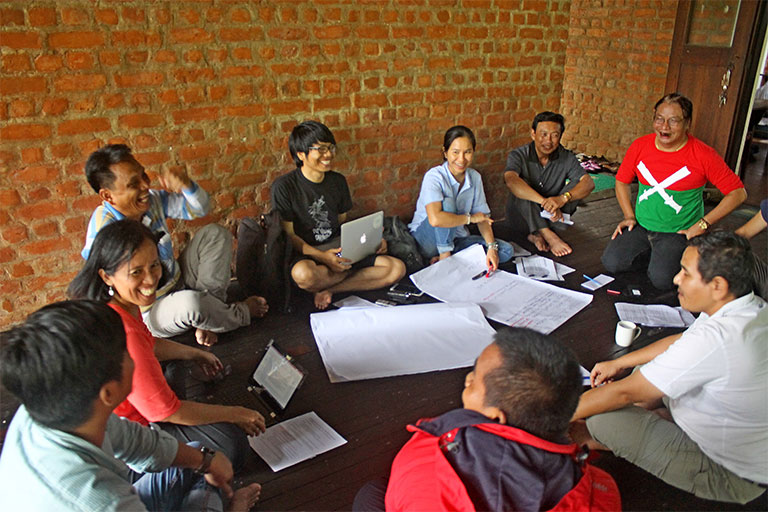
Such a platform is seen as a means for civil society to reclaim spaces for decision making, to exercise democratic deliberations, and to endorse people-centered development contingent on solidarity and complementarity. It can function as a counterweight to systematic attempts to accelerate the global land rush and to divert resources away from the domestic economy and the public sphere.
Most damaging of such efforts, particularly in the Mekong, concern land governance. The last workshop group enumerated pertinent specific issues, from the grants of land concessions to structurally adjusted land policies, that underscore the synergy and symbiosis between the government and the private sector, but often at the expense of affected rural communities.
The workshop group said that severing these ties would entail, for one, sounding the alarm about the soaring trend of commodity rushes and land seizures in the Mekong. Specifically, organizations would do well to conduct a region-wide social investigation into, for example, Chinese-funded deals that have lately been on an overdrive or agribusiness investments funneled via intermediaries, which provide an impetus for the outgrowth of commercial farms, to the detriment of hosts of local small-scale food growers.
Same as the previous two, the third workshop group broached prospects of international solidarity. Annual red-letter days during which like-minded groups involved in land rights advocacy can demonstrate support for local peasant and indigenous people’s struggles, or conduct coordinated or joint activities to highlight the common land and human rights issues they face.
Asserting people’s rights with coordinated strategies to regain control
The indispensability of forging solidarity in the Mekong emerged as a through-line during the workshop. All three groups that had presented touched on a platform they said would serve to establish closer ties and consolidate not just endeavors at obsolescing rural misery, but also the gains from these campaigns.
Creating such a platform is one of the more immediate and doable proposals, in terms of implementation, that the participants could focus on. The platform would be less of a formal network than a coordinating body for groups otherwise stymied by time and distance. They all agreed that those participating in the platform need not be tied down to any kind of commitment organizationally, but ought only to keep others in the loop with updates on, say, instances of land and resource grabbing, and other related materials.
Upon everyone’s approval, the facilitators PANAP, PCFS, and the local partners named the platform, in the meantime, “Mekong Solidarity.” The participants set out formulating a one-year plan, which would be easier to articulate and execute than a more ambitious long-run agenda.
On top of the list is the conduct of a coordinated research, with particular attention to the vigor China has shown in hijacking purportedly pro-development measures in the Mekong and elsewhere. Several participants also brought up the Regional Comprehensive Enhancement Program (RCEP) as one of the feasible subjects of the research and even campaign. Developments in RCEP can be monitored through the Mekong Solidarity platform, too and its consequences in each country could then be evaluated.
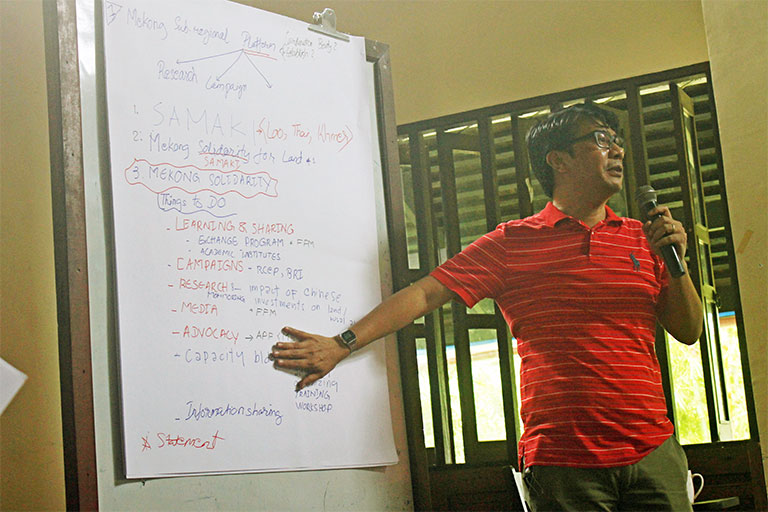
Meanwhile, member organizations of the Asian Peasant Coalition (APC), the largest peasant network in the region, has marked 29 March as the Day of the Landless for four years now, to amplify its call for agrarian reform rooted in the redistribution of land and resources to the tillers. This date was one of those the Mekong participants, as part of the solidarity platform, considered to mark annually, along with the International Human Rights Day (December 10) and the World Hunger Day (October 16), to name a few.
The solidarity actions on these days shall render in stark relief the flip side of what states and multilateral institutions like the United Nations tell of the world’s state of affairs. They signal a refusal to be hectored by dehumanizing bureaucracy and a will to wrest autonomy over public resources from profit-motivated regimes of production. The Mekong participants, after all knew there exists little to no protections the law or international conventions accord their lot, except their own visions of alternative futures.
The panorama of a regional agrarian movement must extend beyond the spaces for resistance too often constricted at the local level, and instead span the whole range of structural causes driving land grabbing. The workshop participants envision that beyond designating red-letter days for joint actions, the Mekong Solidarity can help facilitate the process of building a strong rural people’s movement in the region that will advance people’s sovereignty over vested interests’ force at the regional level. To ford the way forward requires communities to assume the role not just of a stakeholder but a decisive agent able to assert their rights to land and resources, to amplify these demands at a broader arena, not only in today’s crucial juncture but even in the challenging years ahead. ###

#NoLandNoLife Features discuss recent developments, events, and trends on land and resource grabbing and related human rights issues in the region as well as the factors and forces that drive it. Send us your feedback at nolandnolife@panap.net.

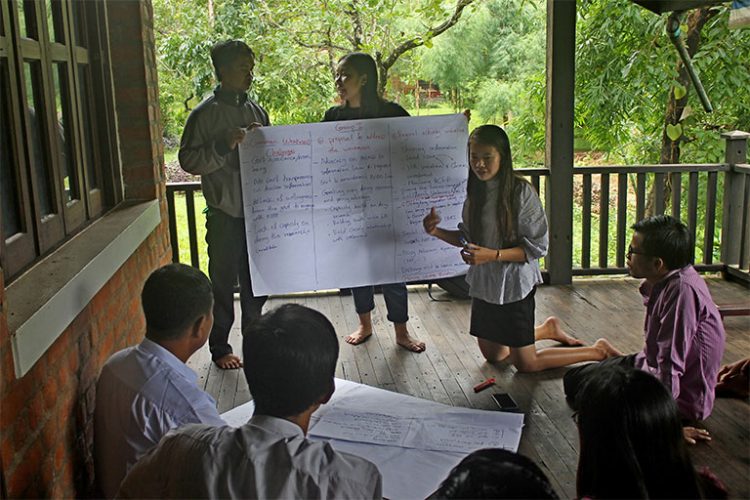






Discussion about this post